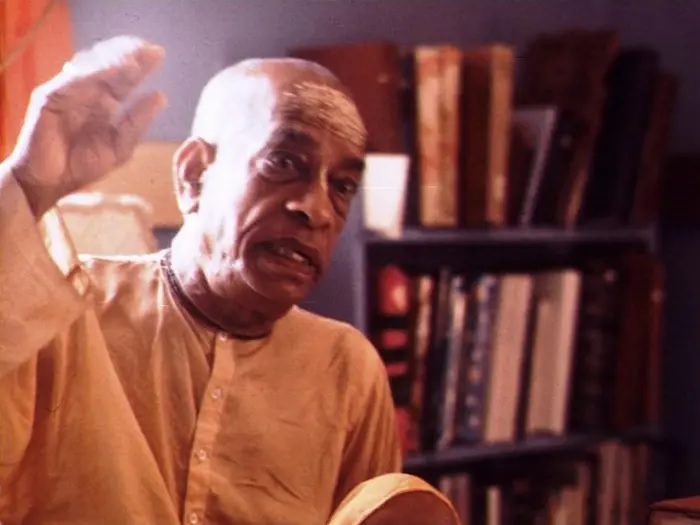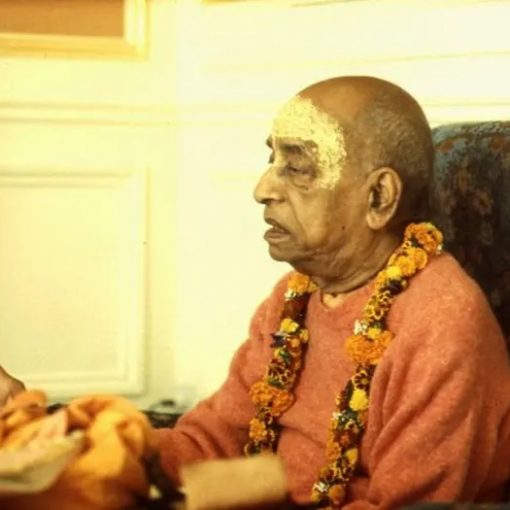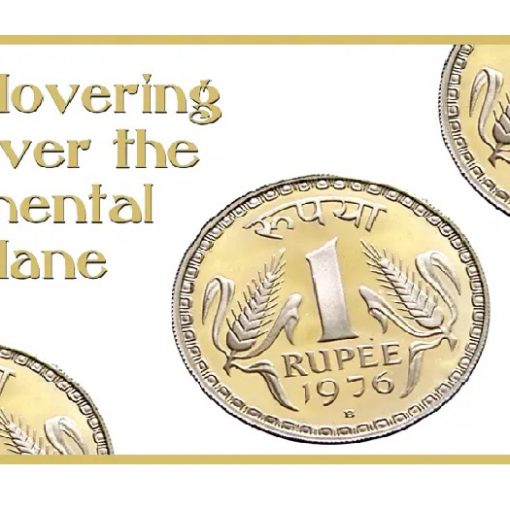For his morning exercise Prabhupada took an easy walk up and down the grass reserve of the front street. He answered questions from his small band of listeners. Gurudasa Swami, AtreyaRishi, Chayavana, PushtaKrishna, GopalaKrishna, Yadubara, and myself.
Yadubara queried why devotees get sick if sickness is a punishment for those who violate God’s laws. Prabhupada’s answer was frank. “Devotees to become a devotee is not so cheap thing. You don’t think that because you have got tilaka you have become devotee. Why do you think like that? “BhaktivinodaThakura sang, ei ta ekakalirchela, naketilaka, galayamala: ‘Here is another follower of Kali. He has got tilaka and mala.’ Sahajbhajankacenmamu, sangalaiyaparerwala, ei ta ekakalirchela: ‘He is worshiping, bhajan, and taking another’s wife. Here is a servant of Kali. Simply he has changed his dress with tilaka and mala.’ BhaktivinodaThakura says. “If you take tilaka and mala and do all nonsense things, then you are not a devotee. You are Kali-chela. To become a devotee is not so easy thing.”
“Devotee means perfect,” AtreyaRishi added. “Oh yes, certainly,” Prabhupada said. “Devotee means he is above these material laws. That is devotee. Brahma-bhuyayakalpate. He is in the Brahman stage. That is devotee. That means sahajiya? ‘Because I have got a tilaka and mala, I have become devotee.’ This kind of cheating will not do.”
Chayavana seemed especially interested in the topic. Prabhupada directly told him that if you do something that is forbidden, then you suffer; that is the law of karma. He said that a devotee follows Krishna’s instructions. Krishna is giving the real truth, and if one takes it he is a devotee; if one does not, he is a nondevotee.
Then what is the role of mercy, PushtaKrishna Swami asked, for those who take and those who don’t? SrilaPrabhupada replied that mercy means, if either unknowingly or by some bad habit, one does some wrong, that will be excused. But deliberate transgressions, he warned, are not forgiven.
GurudasaMaharaja asked what “unknowingly” means. Prabhupada explained. “Unknowingly means…, suppose you are a smoker. So now you have given up everything. But in the association of some smoker you incline, ‘All right, let me smoke.’ Then you regret, ‘Oh, I have done this.’ It can happen. So that is excused. “But if you think, ‘Now I am a devotee of Krishna. I can smoke like anything, and everything will be excused,’ then you are a rascal.” He said that the mercy of Krishna is that He wants us to come back to Godhead even though we have no desire. If we take even one step forward, Krishna will take ten steps toward us.
Then why is there punishment and suffering, another devotee asked. If God is all-loving, why does He make us suffer? Prabhupada told him Krishna loves us, but if we don’t do what He says, then we must naturally suffer as the child is burnt by the fire when ignoring the advice of his father. Yet, he said, that suffering is also mercy because through such experience the soul will be purified and give up his enviousness of Krishna. “So this question of freedom of jiva and control of Krishna,” Atreya asked, “that there is freedom, but at the same time there is no freedom, is a very fine line between the two that sometimes we do not understand.” “But why don’t you understand?” Prabhupada rejoined. “Just like you belong to a free nation, America. Does it mean you are free to do anything and everything? When you say, ‘I belong to this free nation,’ then yes, you are free. But that does not mean that you can do anything and everything.” It was a topic that devotees often debate: just how much independence does the individual soul have?
PushtaKrishnaMaharaja pursued the point. If a person is habituated to smoking, is he free in that activity or has he surrendered his freedom? It is like the person who smokes despite the government printing a warning on the box, Prabhupada said. One is free to do it, but not free from the results. Therefore, the living entity has minute, but not absolute, independence. It is like a child who is free to play, but as soon as he does something wrong, his father is there to correct him.
PushtaKrishna Swami again took it further, wanting more clarification. “This idea of freedom and independence. Is it possible for anyone theoretically to surrender to Krishna at any time?” “Yes.” “So, let’s say someone is in a very degraded condition of life, modes of ignorance and passion: his mind always disturbed. In surrendering to Krishna, is it possible that he can be independent even of the mind?” “You are independent of the mind always. It is your mind. You are not the mind. Then you are independent of the mind always.” “So even a person merged in the mode of ignorance can by some good fortune surrender to Krishna?” “Not good fortune,” Prabhupada told us.
“God, Krishna, says, ‘You do it. Here! Immediately you become fortunate.’ There is no question of waiting for becoming fortunate. You become fortunate immediately. Suppose if I say, ‘Take this bag, $100,000.’ You can take it. Immediately you become rich man. Why don’t you take it?” Understanding Prabhupada’s point that even good fortune is dependant on the mercy of the Lord, GurudasaMaharaja asked how kripa-siddhi works. Prabhupada’s reaction took us all by surprise. “Kripa-siddhi means that you are not willing to take this bag of money. I say, ‘Take it! Take it! Take it!'” He suddenly turned and very vigorously pushed Gurudasa in the stomach, as if he were trying to give him the imaginary bag. Everyone broke out laughing, and GurudasaMaharaja was simultaneously astonished and delighted at the sudden abrogation of the formal guru-disciple relationship. SrilaPrabhupada continued the mimicry and the pushing. He feigned resistance? “No!”? and then began pushing again. “That is kripa-siddhi. Even you are unwilling, I give you in your pocket, push it. That is kripa-siddhi.” There is nothing dry in SrilaPrabhupada’s expression of philosophy. He makes the philosophy come alive because he lives it himself. In so doing he attracts us to use our little independence to surrender to his lotus feet.
Gurudasa mentioned that since we see everyone in the world as potential devotees, we should also serve them so they can become devotees. But Prabhupada clarified the distinction between showing mercy and serving others. “That is not service. That is mercy.” He explained that although a devotee has a mood of service, Vaishnava philosophy is that we serve the higher devotees and show mercy to the lower ones. He said the popular Mayavadi idea that one should serve everyone is wrong. This puzzled me because it says in the sastras that the most advanced devotee sees himself as the lowest of all. So I asked that if that is so, then where is the question of the advanced devotee showing mercy to someone whom he sees as “lower”? Prabhupada replied that the advanced devotee does not see anyone as lower than himself, but his mood is one of sympathy, “Oh, here is a person, he can be a devotee. Let me raise him to the standard.” He concluded, “It is duty. It does not mean he is thinking ‘I am higher.’ No.” “In other words,” PushtaKrishnaMaharaja added, “He doesn’t consider that he is advanced and that therefore he is showing mercy to lower.” “Yes,” Prabhupada affirmed. “He is always thinking, I am lower than the worm, but Lord Krishna wants it, so let me do some service. That’s all.” His comments made it clear it is simply a question of offering assistance to help another advance.
Prabhupada illustrated his point through another comical exchange with Gurudasa. “Therefore we say prabhu. Prabhu means ‘You are my master. Please order me. What can I do for you?’ That should be the attitude. Not, ‘Gurudasaprabhu,’ [Prabhupada said prabhu in an exaggerated fashion, with a bite of sarcasm in it] please come here and brush my shoes!'” We all laughed again, perhaps recognizing something of ourselves in the parody, as he continued. “What kind of prabhu!? He should say, ‘Gurudasaprabhu, can I brush your shoes?’ That is real Vaishnava.” There was no Srimad-Bhagavatam class, since most of the devotees are staying across town, either at the temple or in hotels.
Reference: Transcendental Diary Volume 1 by Hari Sauri Dasa





